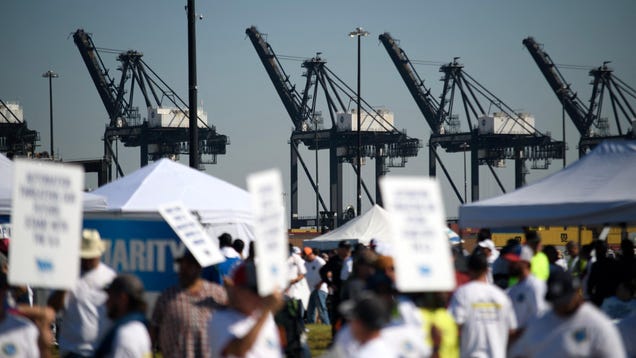The Impact of the East and Gulf Coast Dockworkers Strike on the Automotive Industry
Understanding the Strike’s Origins
On October 1, dockworkers on the East and Gulf Coasts initiated a strike after negotiations between their union and a coalition of port operators broke down. The primary sticking points were demands for pay increases and concerns over the increasing automation in ports. This labor action has significant implications, not only for the workers involved but also for various sectors reliant on the smooth operation of these critical logistics hubs.
The strike’s origins reflect broader trends in labor relations, particularly in industries heavily influenced by automation. As companies seek to reduce costs and increase efficiency, workers often find themselves at odds with management over job security and fair compensation. This situation is not unique to the maritime industry; it mirrors similar conflicts seen in manufacturing and other sectors.
Consequences for Container Traffic and Supply Chains
With the strike underway, container traffic has come to a standstill from Maine to Texas. This disruption is particularly alarming for the automotive industry, which relies heavily on timely shipments of parts and materials. According to a recent report by the National Association of Manufacturers, approximately 80% of automotive parts are transported via sea freight. The halt in operations at major ports could lead to significant delays in production schedules, exacerbating the ongoing supply chain issues that have plagued the industry since the COVID-19 pandemic.
For example, automakers like Ford and General Motors have already faced production slowdowns due to previous supply chain disruptions. The current strike could further strain their operations, leading to potential layoffs or reduced hours for workers in manufacturing plants. A study by the Automotive Industry Action Group (AIAG) indicates that even a minor disruption in the supply chain can lead to a ripple effect, impacting production and sales for months.
Economic Ramifications for Consumers
The implications of the dockworkers’ strike extend beyond the automotive industry. Consumers may soon feel the effects in the form of increased prices and reduced availability of vehicles. A survey conducted by the Consumer Federation of America found that nearly 70% of consumers are concerned about rising prices for goods due to supply chain disruptions. If automakers are unable to source the necessary components, they may have no choice but to raise prices to offset the increased costs of production.
Additionally, the strike could lead to a backlog of vehicles waiting to be shipped to dealerships, further limiting consumer choices in the market. The automotive sector has already been grappling with inventory shortages, and this strike could exacerbate the situation, leading to longer wait times for consumers looking to purchase new vehicles.
Long-Term Implications for Labor Relations
The ongoing dockworkers’ strike also raises questions about the future of labor relations in the maritime and automotive industries. As automation continues to reshape the workforce, unions may find themselves advocating more aggressively for job security and fair wages. This strike could set a precedent for future negotiations, influencing how companies approach labor relations in an increasingly automated environment.
Experts suggest that the outcome of this strike could lead to a reevaluation of how companies balance automation with human labor. According to Dr. Laura D. Smith, an expert in labor relations at the University of California, “The current strike highlights the tension between technological advancement and the need for fair labor practices. Companies must find a way to integrate automation while ensuring that workers are not left behind.”
Navigating the Uncertainty Ahead
As the strike continues, both consumers and businesses must navigate the uncertainty it brings. For consumers, staying informed about potential price increases and availability issues is crucial. For businesses, particularly in the automotive sector, developing contingency plans to mitigate supply chain disruptions will be essential.
In conclusion, the dockworkers’ strike on the East and Gulf Coasts is a critical event with far-reaching implications for the automotive industry and beyond. As the situation develops, it will be important to monitor the negotiations and their outcomes, as they will likely shape the future landscape of labor relations and supply chain dynamics in the years to come.

